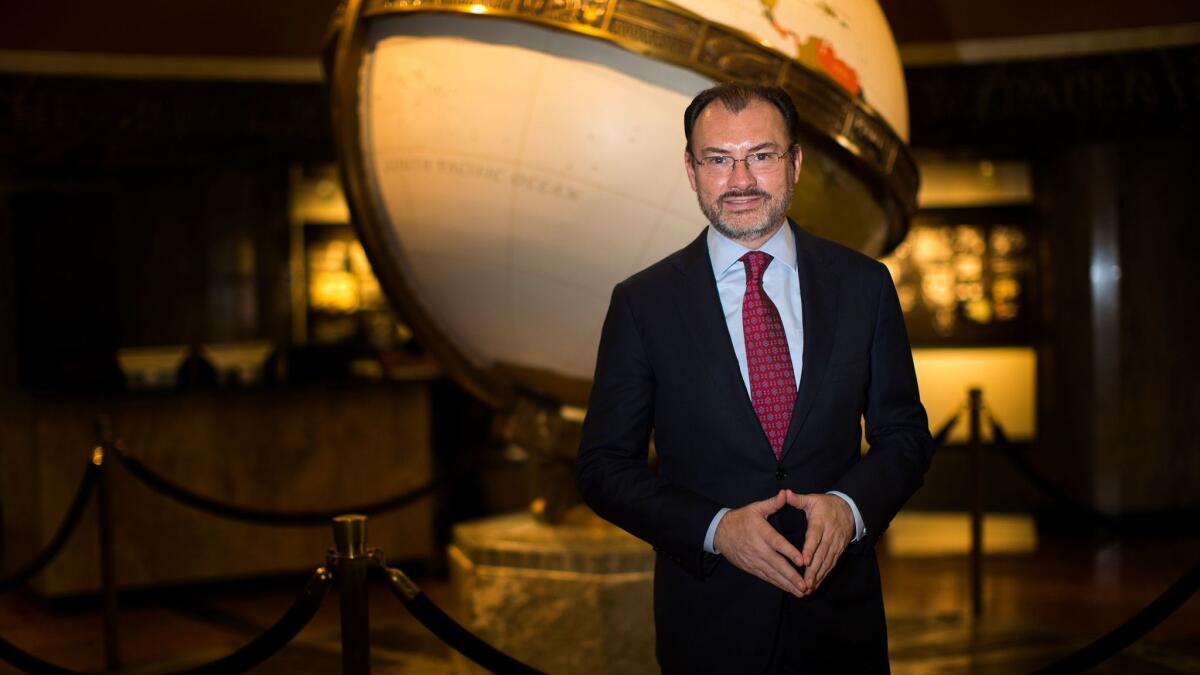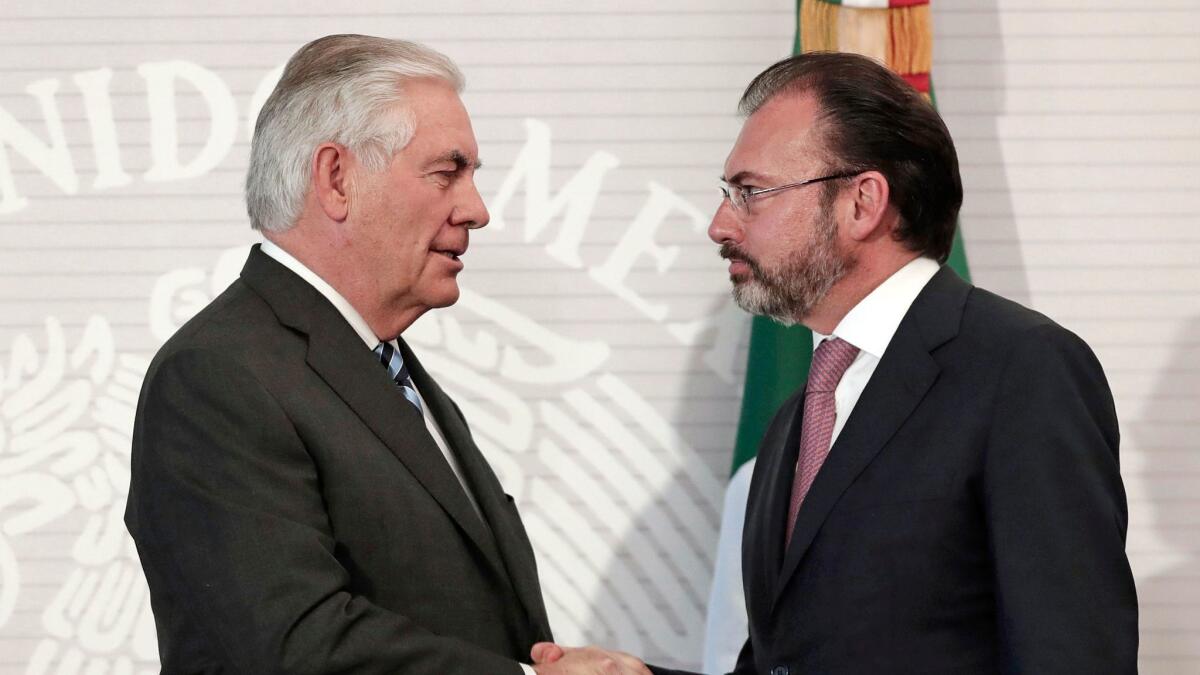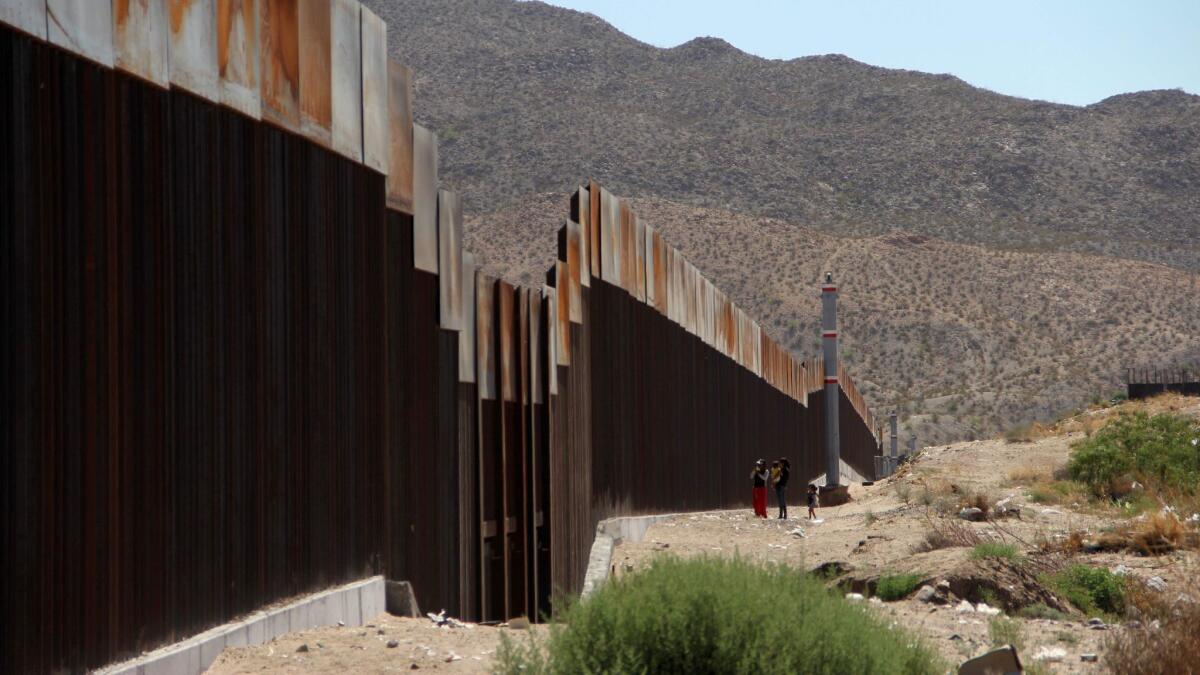The end of DACA would be âa big win for Mexico,â foreign secretary says

Relations between the United States and Mexico have been strained since the inauguration of President Trump, who has threatened to dismantle the North American Free Trade Agreement, vowed to make Mexico pay for a border wall and â during his campaign â called Mexican immigrants rapists.
But Mexico has not given up hope that relations can improve, said its foreign secretary, Luis Videgaray.
âFor us this is the most important relationship in the world,â he said in an interview with The Timesâ editorial board and reporters. âWe believe also for America, Mexico is a very important relationship as well, and itâs in the best interest of both sides to work it out in a constructive way.â
Here is the interview, edited for length and clarity.
Whatâs it like being Americaâs neighbor in the era of the Trump administration?
We are partners and weâre friends. And one thing that neither of us can do is move away from each other. So no matter what the political environment is on either side of the border, weâve got to figure out a way to work together.
I think weâve been able to establish good relationships with people on President Trumpâs team, and that gives us an opportunity to do better than what most people expect in terms of the relationship. And we are working towards that on many fronts, particularly on trade. But I donât want to shy away from telling you that these are challenging times.
Are the challenges of President Trump more or less than the challenges of candidate Trump, in terms of the rhetoric?
There are some things that fortunately President Trump is not saying anymore, things that he said as a candidate. But thereâs still some negativity in things he says about Mexico. The tone is not as inflammatory as it was, but a lot of people in Mexico remember what was said [during] the campaign. That is still there and is somewhat reinforced every now and then.
Does Mexico still consider America a friend?
It is very clear that America is still Mexicoâs friend.
But in my lifetime, this is probably one of the more challenging times that we face in the relationship and particularly because it comes after a time when the opinion that most Mexicans have of the U.S. [has] improved significantly.
Younger generations of Mexicans are not anti-American. On the contrary, [they] feel very natural about the relationship; they like American culture and American goods. Maybe [there were some issues] for my parentsâ and grandparentsâ generations. But not anymore. So the fact that [there is] this position from the White House, itâs certainly a bit of a contrast.
Is it something that can be reversed?
I think so, yes. Absolutely. Weâre not at the point of no return.
If U.S.-Mexico relations continue to deteriorate, how would this impact the role Mexico plays in helping with the war on drugs, fighting terrorism, stemming migration?
The political margin for continuing support in all of these tasks would be reduced. Any Mexican government would face strong pressure from public opinion questioning any kind of cooperation with a U.S. government that is not willing to cooperate with Mexico on other stuff.

You have been quoted as saying that renegotiations of the North American Free Trade Agreement, NAFTA, could potentially end in a better agreement that would be a win for everybody involved. How so?
The treaty can be better in many ways. We acknowledge that this is a relatively old treaty â 25 years since it was negotiated, 23 since it was enacted. The world has changed. Weâve learned a lot by doing other agreements. So it can be strengthened in a way that is quite positive for the three economies, by introducing better standards for things like the environment, labor, intellectual property protection, by introducing things that were excluded from the original treaty either because of regulation â think of energy â or things that didnât exist, like everything related to the Internet and e-commerce.
What do you say to unemployed American auto workers who believe they lost their job because of NAFTA and they voted for Trump because he promised to possibly scrap this agreement?
I think a lot of scapegoating has been done on NAFTA. The reality is, a lot of the jobs have been lost mostly to technology. And that is something that happens well beyond the reach of NAFTA or any other trade agreement.
Many people in those states that were red states in last yearâs election depend on NAFTA for a significant amount of jobs.
You cannot have a simplistic approach to this. Yeah, some jobs might have moved to Mexico [but] some jobs are created because of trade with Mexico.
Overall, a substantial number of jobs in agriculture, in manufacturing, depend on having access to the Mexican market.
What would be Mexicoâs future without NAFTA?
Certainly Mexico is better with NAFTA than without it. But itâs not the end of the world if NAFTA does not remain. We will continue doing business with the U.S. only not through NAFTA rules, through [the World Trade Organization], just as a lot of countries do.
We probably will be looking at other arrangements, expanding other trade relationships including [with] Brazil, Asia, Europe. So we do have a contingency plan.
Is phasing out the Deferred Action on Childhood Arrivals program, DACA, a bad idea?
I donât know of any country that is willing to ship doctors, accountants, lawyers to another country. Thatâs just a transfer of human capital. That would be a big win for Mexico to have these young kids that are law-abiding, creative, full of energy and well trained. All of them have a high school diploma. And the majority of them are college-educated.
It would be a big loss to the U.S., to the U.S. economy in particular. At a time when there are real labor shortages in the U.S., itâs hard to understand why you want to ship out of the country this very talented human capital.
But to us, it doesnât matter if itâs the Mexican economy winning and the U.S. economy losing. What really matters is what these young people want, and they want to stay. And for a reason. This is a country where they grew up. They are proud of their Mexican origin and heritage, but they feel American and they want to stay.
But why should Americans embrace people who came here illegally? Rules are rules.
Having a few of these DACA people around might help to bring investments into the U.S. that would create a lot of jobs even for those that complain.
What we want to have is a rapidly growing economy. Thatâs the best tool for creating good paying jobs, and having talented people creates growth. So again, this is about value creation. This is not a zero-sum game.
What kind of arrangements are being made to integrate DACA returnees if they have to go back to Mexico?
Weâre focusing on a few things. First of all, education. We are changing the laws so that education certificates issued in the U.S. are immediately recognized by Mexican institutions, so they will have no problems. If they are accountants or physicians, they can have a job in Mexico.
Second, weâre making sure that we have spaces in all of public universities around the 32 states to offer all educational opportunities for the DACA people who want to continue their education in Mexico.
Third, together with the private sector, our Ministry of Labor is putting together a list of job opportunities that are suitable to their skills. Itâs very appealing to have college-educated, English-speaking people and many companies in Mexico are looking for that profile of people.
And through our social programs and our social network, we are making sure that if they come, they will have health coverage, they would be eligible for state-sponsored loans, and then in general the whole array of benefits that social programs in Mexico provide.
Is President Trumpâs desire to build a wall between the U.S. and Mexico being addressed by Mexico?
The wall is not a bilateral issue. Itâs not something that we discuss with the American government. Every country has a sovereign right to protect its borders, the best way that they see fit. So when we meet with U.S. representatives, we never discuss the wall.
We obviously donât like the idea of a wall. Itâs not a friendly gesture. And my own personal opinion is that it might not even work for the purposes that itâs meant to work for.
But thereâs absolutely no possibility that Mexico would contribute to the financing of a barrier between our countries. And as weâve said many times before that thatâs not a bargaining position. Thatâs not a negotiating strategy. Our position is based on principle, on our sovereignty and on our dignity. And that will not change.

But there must be shared interest in having a secure border?
We want to see the border as secure as possible [to] stop illegal flows both ways, including guns that are shipped illegally into Mexico, including U.S. cash that goes into the hands of the [drug] cartels and creates a lot of violence both [in the U.S] and in Mexico in particular. So we definitely have an interest in having a secure border. But a wall is not it.
If the U.S. government wants to engage in a serious conversation about border security, we are absolutely open to that.
What is it going to take to get U.S.-Mexico relations back to a high point?
We need to have a good agreement on trade that obviously includes Canada. Our security cooperation has got to be based on the principle of shared responsibility. Weâve got to move on from blaming each other about security issues, the drug trade and international crime organizations, and I think weâre on a good track. Weâve got to cooperate more on Central America. Itâs a fact that a lot of migration flows that we are seeing into the U.S. through Mexico come from Central America.
Some Americans have stereotypes about Mexico and Mexicans. What do such people need to know?
A lot of people donât know that they have a job because they are selling things to Mexico and to Mexicans.
Thereâs substantial Mexican capital in the U.S. There are many companies that are Mexican-owned that have invested in the U.S., and Mexican companies create jobs in the U.S. for Americans, not for Mexicans.
The fact is that there are a lot of good things about the U.S.-Mexico relationship that happen all across the United States.
To read the article in Spanish, click here
For more on global development news, see our Global Development Watch page, and follow me @AMSimmons1 on Twitter
ALSO:
A new report shows just how much Trump has hurt Mexicoâs view of the U.S.
They helped clean up the wreckage of 9/11. Now they face the threat of deportation
More to Read
Sign up for Essential California
The most important California stories and recommendations in your inbox every morning.
You may occasionally receive promotional content from the Los Angeles Times.











